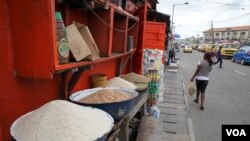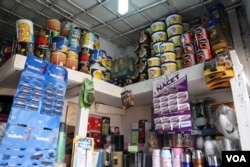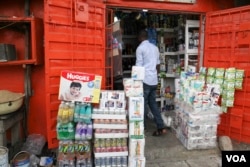As Nigeria struggles with the price of imported goods and slow economic growth, a social media campaign is encouraging Nigerians to buy local.
Championed by an outspoken senator and spread across social media, #BuyNaijaToGrowTheNaira advocates are choosing locally made products over imports as the global drop in the price of petroleum takes its toll on oil-dependent Nigeria.
“I say the only way to solve our economic problem is to support made-in-Nigeria goods and services, because if we did that, some of the money stays here. We could support our people here,” said the senator, Ben Murray-Bruce. “We have great entrepreneurs in this country.”
Sales of crude oil bring in most of Nigeria’s government revenues and account for much of the exports of Africa’s largest economy.
The price of petroleum has slid to around $35 per barrel from about $100 two years ago. The ensuing drop in oil revenue has hurt the naira currency. It has lost about 50 percent of its value on the black market, even though the government has managed to keep its official rate stable by spending foreign reserves and imposing capital controls.
Nigeria has spent decades developing its oil sector at the expense of other industries. As a result, it imports much of its household goods and electronics.
Bills for importers have to be settled in foreign currencies, and with a weak naira, that’s affecting prices at marketplaces across the country.
Sitting in his shop at Lagos’ Obalende Market, Sunday Emeka said he has to charge more for foreign goods like diapers.
“The importing of the goods makes the dollar rise up,” he said. “People are just complaining.”
Some Nigerian entrepreneurs have praised Murray-Bruce’s campaign.
“It’s something we should all join,” said Ani Bassey-Eyo, who runs a food company that sells honey. “There’s no reason why we should import certain things like toothpicks, or certain things we can make back home.”
Others see it as shortsighted.
“He’s not really looking at the real structural issue that’s at hand,” said Chuba Ezekwesili, a research analyst at the Nigerian Economic Summit Group.
Nigeria ranks dismally in the World Bank’s business climate rankings, scoring 169th out of 189 countries surveyed. The bank cites the unreliability of electricity and slow pace of bureaucracies for the low score.
It would be best to tackle problems like these that drive up the cost of doing business in the country, Ezekwesili said. That would allow Nigeria to export more than just petroleum, cushioning the economy when prices fall.
“Institutional and infrastructural fixes need to be done,” Ezekwesili said. “[Murray-Bruce] is not looking at that.”
There are signs that Nigerians have, over the years, grown fonder of local industries. When Bassey-Eyo was growing up, he said, few people wanted to listen to Nigerian artists or wear local clothing. But now, Nigerian artists are popular across West Africa, and the country’s Nollywood film industry ranks among the world’s largest.
“We have evolved, particularly with Nollywood and the entertaining industry setting the trend,” Bassey-Eyo said. “I think it’s now time ... for goods to transcend that sort of perception line.”














